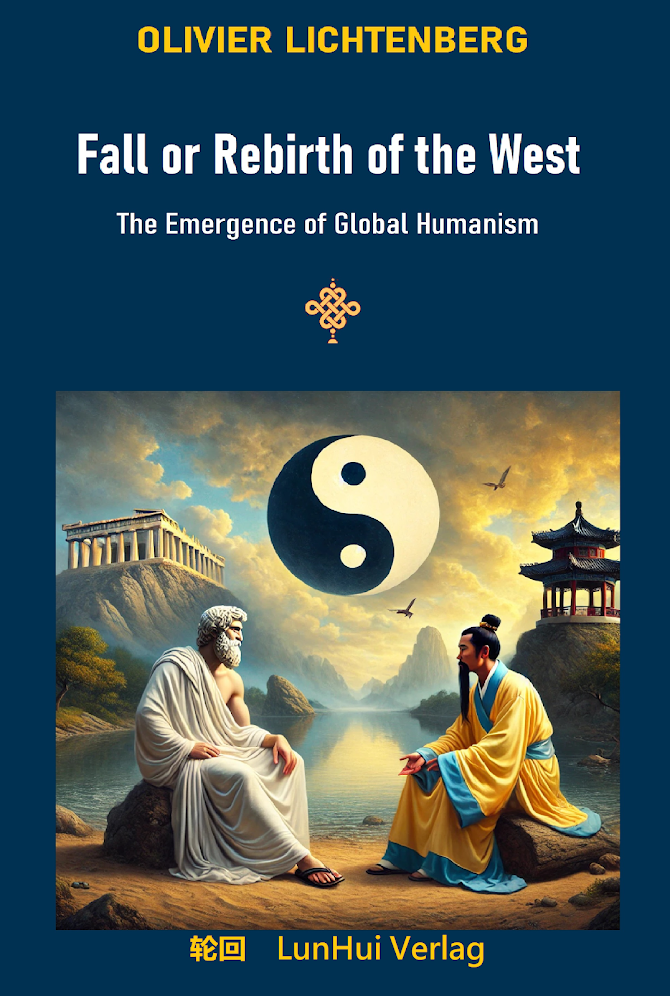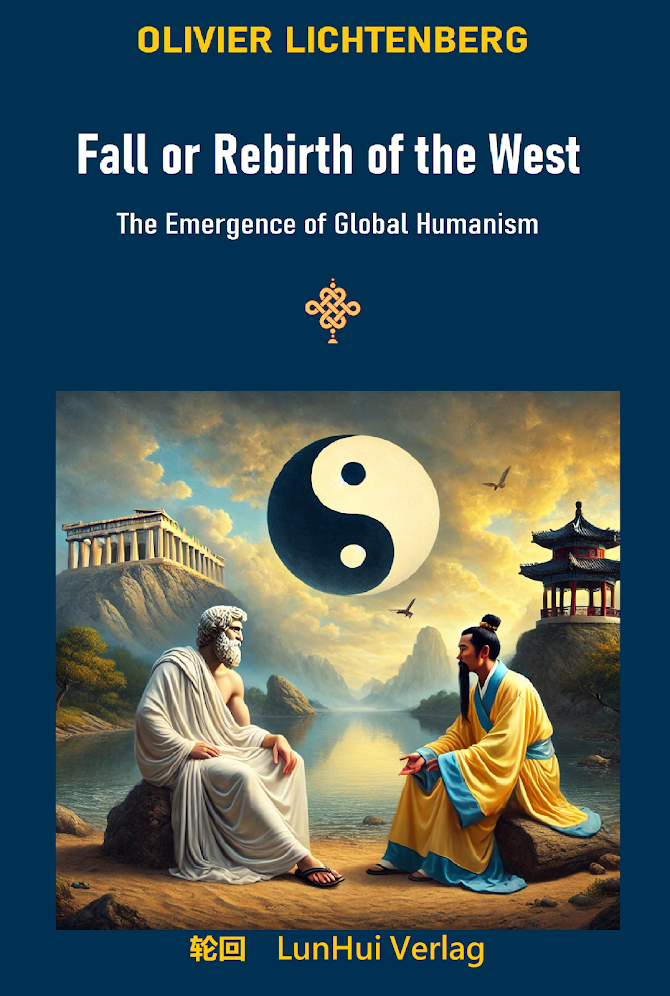
Interview with Olivier Lichtenberg – About the book “Fall or Rebirth of the West”
Today we discuss with Olivier Lichtenberg his latest book, Fall or Rebirth of the West: The Emergence of Global Humanism. Olivier talks about his sources of inspiration and theories.
Olivier, your background is quite interdisciplinary – linguistics, economics and a teaching career in several Asian countries… How did these experiences lead to the writing of this book?
I have always been fascinated by borders – language, culture, ideas. My studies in language and economics were important, but my real education took place in Asia. There I lived in a world with values and priorities that were at odds with the European thinking I had grown up with. At first I was mostly watching, adapting. But soon one question kept gnawing at me: how could two civilizations – Greece and China – that began at the same time, develop into such completely different ways of thinking, living together and doing economics?
That question never left me. I started looking for answers – not just in history or politics, but in the deepest structures of thought. What began as an intuitive curiosity grew into an investigation that knew no boundaries, neither between disciplines nor between paradigms. This book is the fruit of that long search.
The central theme of the book is the divergence between Eastern and Western epistemologies. Why is this question so crucial today?
The central theme of my book is the divergent way East and West view knowledge and truth. That sounds abstract, but it goes to the heart of everything. How we determine what is true, how we deal with contradictions, what we find meaningful … that is the basis for ethics, economics, politics and even how we experience emotions.
We often see technology or political structures as the engine of our civilization, but in fact they are merely expressions of deeper assumptions. The West built its world on the idea of mastery: control over nature, over uncertainty, over time. The East, on the other hand, rather sought attunement: living in harmony with natural rhythms, relational ethics and a cyclical sense of time.
Today we are in global crises: from climate to culture, from social cohesion to meaning. Not only are our systems failing, but the foundations from which they were born are faltering. If we fail to see through these deeper ways of thinking, we risk misdiagnosis. Even worse, we then continue to use the same logic that got us into this crisis.
In your book, Heraclitus and Laozi return as key figures. Why exactly these two thinkers, and what makes their vision of change so relevant to your analysis?
For me, they embody two radically different ways of understanding change. Heraclitus saw the world as a constant stream of contradictions: everything is in flux, and it is precisely conflict that creates new order. That idea became a cornerstone of Western thought – a worldview in which reality must be deciphered, contested and ultimately mastered.
Laozi looks at this very differently. For him, change is not a struggle, but a natural process, a flow in which you go along instead of trying to control it. The Dao is not a system you control, but a path you walk.
Their influence extended far beyond philosophy – they also formed the basis for economies, educational systems and political structures. It almost felt as if they imposed themselves as the two primal forces of divergent lines of thought. Following their legacy through the centuries was inevitable.

You also mention thinkers such as Leibniz, Paul Mus, McGilchrist and Tran Duc Thao. How have they influenced your research and work?
I see them as bridge builders. They were all thinkers who dared to break through existing frameworks. Gottfried Willhelm Leibniz, for example, was one of the few Western philosophers who really wanted to delve into Chinese metaphysics. He did not just want to compare, but to learn from it. His concept of the monads (an indivisible, spiritual building block of reality according to Leibniz, reflecting the entire universe from its own perspective) is already a step toward a nonlinear, non-mechanical worldview.
Paul Mus brought profound insights into the cosmologies and knowledge structures of Southeast Asia. Tran Duc Thao sought to bring Marxism into conversation with phenomenology as well as with Eastern traditions of thought, showing that even historical materialism must be revised in light of cultural experience and lived structures.
Then again, British psychiatrist Iain McGilchrist offered me a very different kind of tool: his research on the cerebral hemispheres gave me a neurological vocabulary to describe the difference between Eastern and Western thinking. He shows how the West is often trapped in an over-dominant “left-brain mode” – reductionist, abstract, controlling – while the East nurtures a more contextual, holistic and relational approach, akin to a “right-brain orientation.
It’s not that these thinkers gave me immediate answers. They did help me sharpen my questions. With their thinking, I was able to outline the contours of a possible synthesis of worlds of thought – not a sum, but a transformation.
The subtitle of your book talks about “The Emergence of a Global Humanism.” What does that mean specifically?
It is both a diagnosis and an invitation. Our world system is now global, with global economies, logistics and crises. A shared ethos, however, there is none. Western humanism, rooted in the Enlightenment, emphasizes autonomy, reason and individual rights. Eastern traditions, such as Confucianism and Taoism, emphasize duty, harmony and connectedness. Both perspectives are valuable but also limited.
By “Global Humanism,” I mean the emergence (not the imposition) of a planetary ethic that draws from multiple sources of civilization. It is not about erasing differences, but creating a framework of thought in which diversity can coexist productively. It is a humanism that focuses not on the isolated individual, but on the human being as a relational being. Such an ethos cannot be enforced; it must emerge from deep philosophical dialogue and mutual recognition.
Your book ends with the idea of an “Ethosphere.” Can you explain what you mean by that?
For me, the Ethosphere is a speculative concept, but not a utopia. It is inspired by the idea of the Noösphere, by Pierre Teilhard de Chardin. The Noösphere is the layer of conscious thought that envelops the earth – but in our time, mere knowledge is not enough. We have more information than wisdom, more computing power than moral depth.
The Ethosphere represents a growing field of shared ethical consciousness: a global resonance in which decisions are based not only on intelligence but also on responsibility, connectedness and relational awareness. It is pluralistic but not relativistic; it embraces differences but also actively seeks dialogue. It is not a set program, rather a direction – a way of becoming collectively more aware of the consequences of our knowing and acting.
And finally, for whom is Fall or Rebirth of the West intended?
I am writing for anyone who senses that something fundamental is missing in how we understand the world, but does not yet have the right words for it. Academics will find thorough arguments and references in it, but the book is deliberately not written in academic jargon. It is intended for the thinking layperson, the world-oriented teacher, and the curious reader who realizes that our problems are not just economic or political, but touch deeper questions of civilization.
I do not believe in passive readers. Those who pick up this book enter into a dialogue – not just with me, but with the long tradition of human thought that I am trying to open up.
Recente bijdragen
Fall or Rebirth of the West: The Emergence of Global Humanism
Fall or Rebirth of the West: The Emergence of Global Humanism Fall or Rebirth of the West: The Emergence of Global Humanism is an ambitious and […]

No comments have been posted yet!